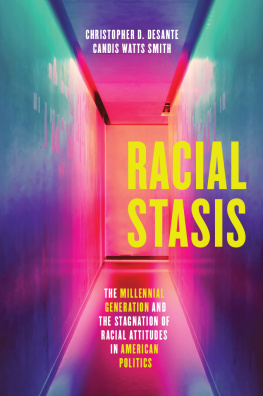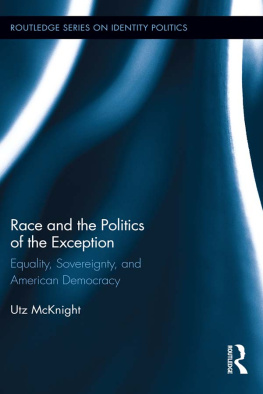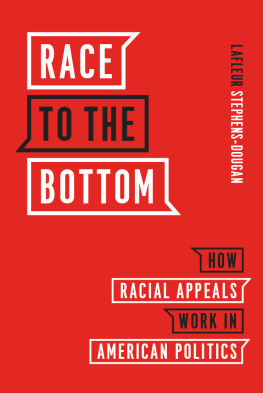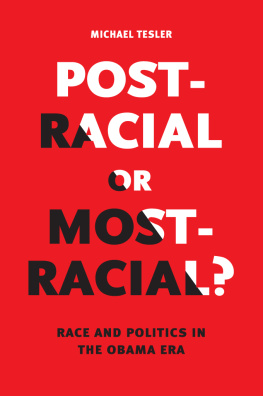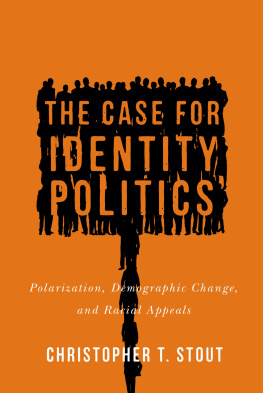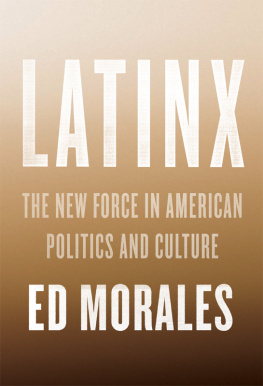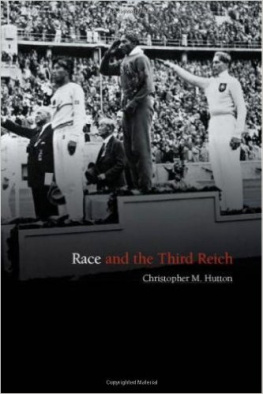The University of Chicago Press, Chicago 60637
The University of Chicago Press, Ltd., London
2020 by The University of Chicago
All rights reserved. No part of this book may be used or reproduced in any manner whatsoever without written permission, except in the case of brief quotations in critical articles and reviews. For more information, contact the University of Chicago Press, 1427 E. 60th St., Chicago, IL 60637.
Published 2020
Printed in the United States of America
29 28 27 26 25 24 23 22 21 20 1 2 3 4 5
ISBN-13: 978-0-226-64359-5 (cloth)
ISBN-13: 978-0-226-64362-5 (paper)
ISBN-13: 978-0-226-64376-2 (e-book)
DOI: https://doi.org/10.7208/chicago/9780226643762.001.0001
Library of Congress Cataloging-in-Publication Data
Names: DeSante, Christopher D., author. | Smith, Candis Watts, author.
Title: Racial stasis : the millennial generation and the stagnation of racial attitudes in American politics / Christopher D. DeSante and Candis Watts Smith.
Description: Chicago : University of Chicago Press, 2020. | Includes bibliographical references and index.
Identifiers: LCCN 2019025423 | ISBN 9780226643595 (cloth) | ISBN 9780226643625 (paperback) | ISBN 9780226643762 (ebook)
Subjects: LCSH: RacismUnited States. | DiscriminationUnited States. | United StatesEthnic relations.
Classification: LCC E185.615 .D475 2019 | DDC 305.800973dc23
LC record available at https://lccn.loc.gov/2019025423

This paper meets the requirements of ANSI/NISO Z39.48-1992 (Permanence of Paper).
In many ways, the authors of this book represent Dr. Martin Luther King Jr.s dream. One of the authors of this book is a White man, the other a Black woman. We went to graduate school together at Duke University, where this project first began to take flight. We each have a doctorate. We both live comfortable, upper-middle-class lives as college professors. Ostensibly, we are equals in an American society that promises benefits for all who work hard. As we were both born in the early 1980s, we are also millennials, members of a generation that is markedly different from those that have come before us. Millennials, ourselves included, have lived their entire existence in an America where two people like us can work together and be friends with one another without any pushback from our peers or our families. Most people in our generation were socialized to believe that all people are equal despite race or gender, to value diversity, and to appreciate multiculturalism. We were inculcated to believe that Americas deep racial divisions had been healed. We belong to a generation that was lectured about the history of American racism where everything was presented in the past tense. Indeed, what makes millennials different is that most of our experiences of overt racism primarily come secondhand, usually in the form of history lessons taught during the month of February. We have been tasked by our predecessors to put the final nail in racisms coffin, to be color-blind, and to help America finally reach its post-racial goal.
Without a doubt, America has made great strides in terms of racial progress. Those who seek to provide evidence that race is becoming a less divisive issue in American politics can point to the two of us, or people like us in their own lives. They can point to Oprah, the Carters (Beyonc and Jay-Z), and LeBron James as successful, ber-rich Black Americans. They can point to Sonia Sotomayor, Marco Rubio, and Julin Castro as signs that Latinx people are politically incorporated. Americans today can point to Lisa Ling, Mindy Kaling, and Jackie Chan as household names while being shocked at the poor taste Hollywood executives showed when casting Whites to portray characters of color only a few decades ago.
In the political realm, many Americans point to Barack Obamas 2008 election to the presidency as the ushering in of a post-racial America. Not only was there a high turnout of African Americans and Latinx people, the overwhelming majority of whom voted for Obama, younger Whites also turned out in record numbers and also gave the majority of their votes to Obama. White Americans under the age of thirty preferred Obama to Senator John McCain 54 to 44 percentthe reverse of the aggregate White population, which gave 54 percent of its vote to McCain while only giving 44 percent of its vote to Obama (Dahl 2008; Keeter, Horowitz, and Tyson 2008). For some, this fact served and still serves as prima facie evidence not only of a significant decline in anti-Black racial attitudes among White Americans but also that America has begun realizing its post-racial dream (Nagourney 2008; Thernstrom and Thernstrom 2008; Tolson 2008). So why are so many Americans, especially the two of us, still talking about race?
For every story that fits the post-racial narrative, there is another that shows there is still progress to be made. Again, consider the two of us. Research shows that 75 percent of White Americans do not have a non-White friend. In a scenario where a White American has a hundred friends, ninety-one of them would be White. In the same scenario for Blacks, eighty-three of those friends would be Black (Ingraham 2014). Furthermore, of all of the doctorates awarded in the United States, only 7 percent of them were earned by Black Americans, and among the 10,595 members of the American Political Science Association, 338 of them are Black, and only 173 of those are Black women. The chances of us interacting, no less being friends, were really quite low.
Whats more, Christopher began studying race in American politics because he was constantly receiving mixed messages regarding racial progress from his friends, his family, and the media. Growing up in a working-class household in Pennsylvania, he was often around folks who were not hesitant to express what scholars now refer to as old-fashioned racial animus. Friends and family alike would unapologetically characterize Blacks as lazy, unintelligent, dishonest, and prone to criminal behavior and would use the N-word when talking about African Americans. These comments were relayed as matters of fact, rarely examined by many adults in his early life. In graduate school, when he began working on racial attitudes, many of his White classmates would ask him a question that Candis never got: Why do you work on race?
We acknowledge that we are just a small sample, an anecdote. Looking through a wider lens, we find many more signs of inequality. Of the 540 Americans who have acquired the status of billionaire, there are only 3 who are Black: Oprah Winfrey, Robert Smith, and, most recently, Michael Jordan. While there are some very wealthy Blacks in the United States, White Americans own about ten times more wealth than Black families, and optimists calculate that if the average Black family accumulates wealth at the same rate Black families have in the previous three decades, it would take that family about 228 years to amass the same amount of wealth that the average White family has today (Asante-Muhammad et al. 2016). Meanwhile, about 6.4 percent of non-Hispanic White families are living in poverty, in contrast to the 20.2 percent of Black families who are in the same condition (US Census Bureau 2016). We should add that many (conservative White) Americans also rely on the model minority myth to deflect attention from the ongoing discrimination that Asian Americans face, and movie executives
 This paper meets the requirements of ANSI/NISO Z39.48-1992 (Permanence of Paper).
This paper meets the requirements of ANSI/NISO Z39.48-1992 (Permanence of Paper).
